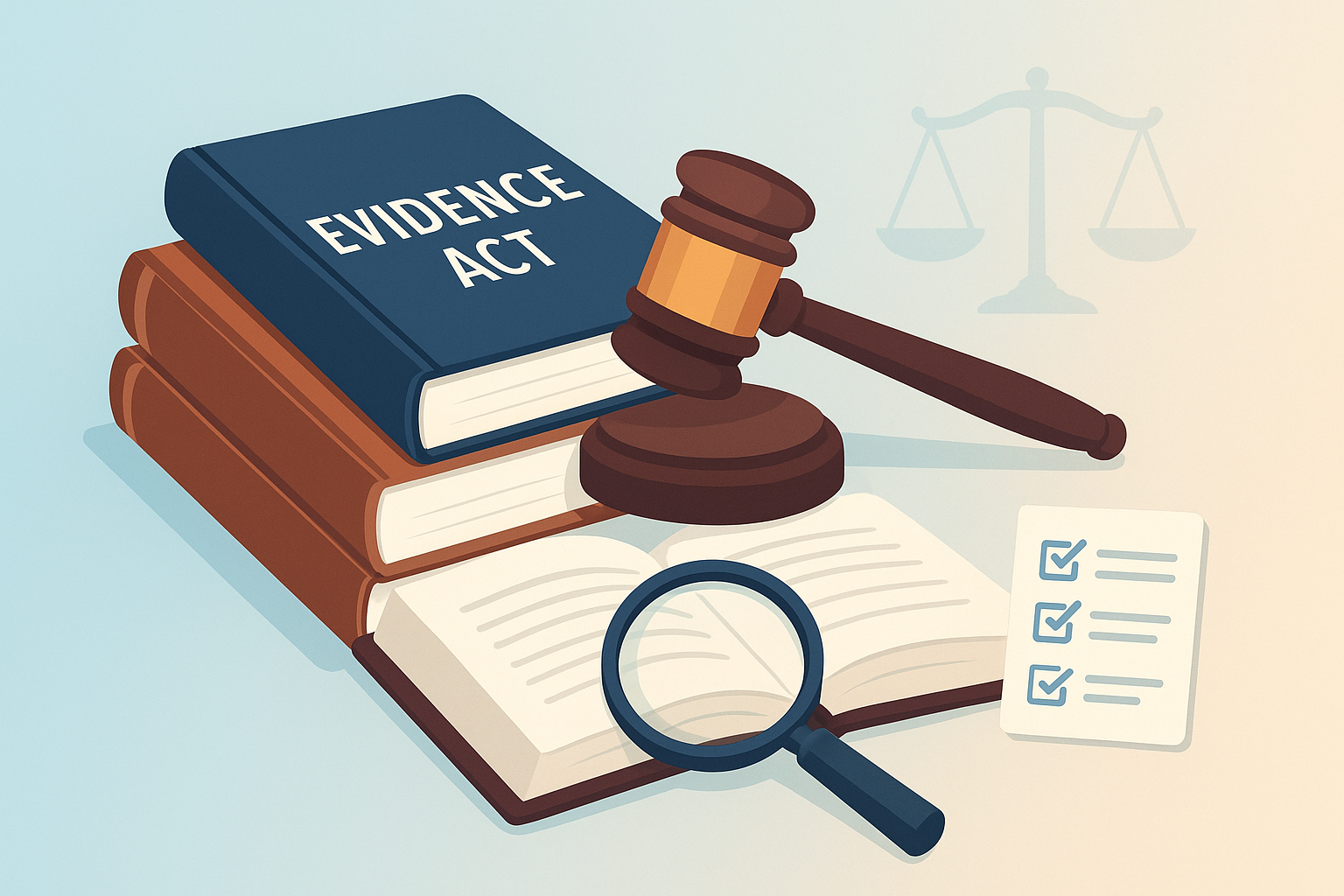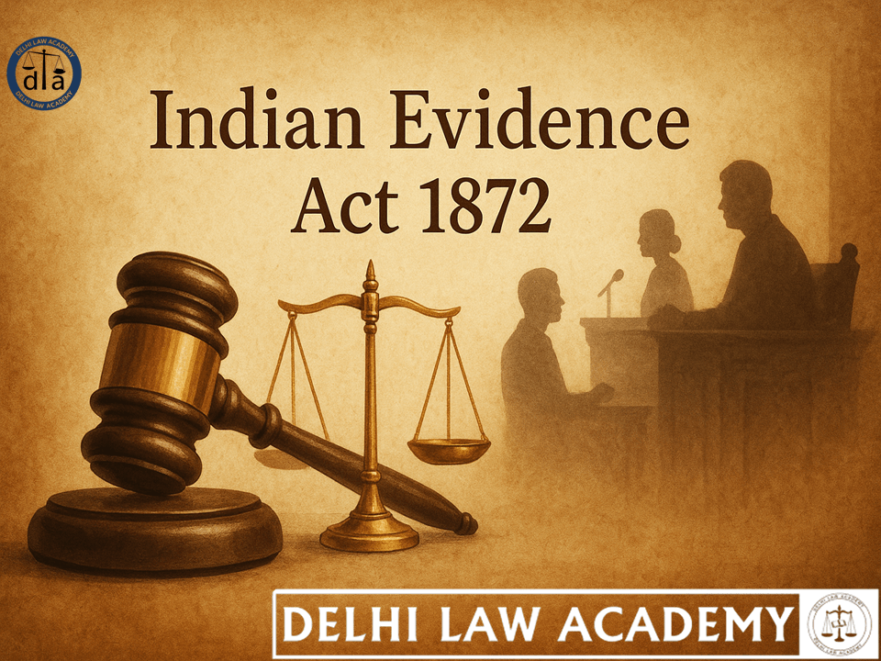
📜 The Indian Evidence Act 1872: Section 11 – Alibi
Facts Not Otherwise Relevant Become Relevant
Facts not otherwise relevant are relevant:
- ✅ if they are inconsistent with any fact in issue or relevant fact
- ✅ if they make the existence or non-existence of any fact in issue or relevant fact highly probable or improbable
Illustration (a)
The question is whether A committed a crime at Calcutta on a certain day. The fact that on that day A was at Lahore is relevant.
The fact that near the time when the crime was committed A was at a distance from the place where it was committed which would render it highly improbable, though not impossible, that he committed it is relevant.
Illustration (b)
The question is whether A committed a crime. Circumstances are such that the crime must have been committed either by A, B, C or D. Every fact which shows that the crime could have been committed by no one else and that it was not committed by either B, C or D is relevant.
💼 The Plea of Alibi
The plea of alibi flows from Section 11 and is demonstrated by Illustration (a). The word “alibi” is of Latin origin and means “elsewhere”.
It is a convenient term used for the defence taken by an accused that when the occurrence took place he was so far away from the place of occurrence that it is highly improbable that he would have participated in the crime.
Alibi is not an exception (special or general) envisaged in the Indian Penal Code or any other law. It is only a rule of evidence recognized in Section 11 of the Evidence Act that facts which are inconsistent with the fact in issue are relevant.
⏱ When is the Plea of Alibi Required?
- ✅ The plea of alibi taken by the accused needs to be considered only when the burden which lies on the prosecution has been discharged satisfactorily.
- ✅ If the prosecution has failed in discharging its burden of proving the commission of crime by the accused beyond any reasonable doubt, it may not be necessary to go into the question whether the accused has succeeded in proving the defence of alibi.
- ✅ Once the prosecution succeeds in discharging its burden then it is incumbent on the accused taking the plea of alibi to prove it with certainty so as to exclude the possibility of his presence at the place and time of occurrence.
📚 Burden of Proof
- ✅ The burden of the accused is undoubtedly heavy. This flows from Section 103 of the Evidence Act which provides that the burden of proof as to any particular fact lies on that person who wishes the court to believe in its existence.
- ✅ While weighing the prosecution case and the defence case, if the balance tilts in favour of the accused, the prosecution would fail and the accused would be entitled to the benefit of reasonable doubt.
⚖️ Supreme Court on the Defence of Alibi
Jayantibhai Bhenkarbhai v. State of Gujarat [2002 SC]
Section 11 of the Evidence Act, 1872 provides that facts not otherwise relevant are relevant if they are inconsistent with any fact in issue or relevant fact or if by themselves or in connection with other facts they make the existence or non-existence of any fact in issue or a relevant fact highly probable or improbable.
The plea of alibi flows from Section 11 and is demonstrated by Illustration (a). The word “alibi” is of Latin origin and means “elsewhere”. It is a convenient term used for the defence taken by an accused that when the occurrence took place he was so far away from the place of occurrence that it is highly improbable that he would have participated in the crime. Alibi is not an exception (special or general) envisaged in the Indian Penal Code or any other law. It is only a rule of evidence recognized in Section 11 of the Evidence Act that facts which are inconsistent with the fact in issue are relevant.
The burden of proving commission of offence by the accused so as to fasten the liability of guilt on him remains on the prosecution and would not be lessened by the mere fact that the accused had adopted the defence of alibi. The plea of alibi taken by the accused needs to be considered only when the burden which lies on the prosecution has been discharged satisfactorily. If the prosecution has failed in discharging its burden of proving the commission of crime by the accused beyond any reasonable doubt, it may not be necessary to go into the question whether the accused has succeeded in proving the defence of alibi. But once the prosecution succeeds in discharging its burden then it is incumbent on the accused taking the plea of alibi to prove it with certainty so as to exclude the possibility of his presence at the place and time of occurrence. An obligation is cast on the court to weigh in scales the evidence adduced by the prosecution in proving the guilt of the accused and the evidence adduced by the accused in proving his defence of alibi.
If the evidence adduced by the accused is of such a quality and of such a standard that the court may entertain some reasonable doubt regarding his presence at the place and time of occurrence, the court would evaluate the prosecution evidence to see if the evidence adduced on behalf of the prosecution leaves any slot available to fit therein the defence of alibi. The burden of the accused is undoubtedly heavy. This flows from Section 103 of the Evidence Act which provides that the burden of proof as to any particular fact lies on that person who wishes the court to believe in its existence. However, while weighing the prosecution case and the defence case, if the balance tilts in favour of the accused, the prosecution would fail and the accused would be entitled to the benefit of that reasonable doubt which would emerge in the mind of the court.
Reverting back to the facts and circumstances of the case and keeping in view the nature of the accusations made against the accused-appellant and weighing the same against the overwhelming defence evidence adduced by the accused-appellant in support of his plea of alibi, in our opinion, a reasonable doubt is created in the prosecution case so far as the participation of this accused-appellant in the incident is concerned. We have already noted, the High Court itself, having arrived at a finding in favour of the accused-appellant that his presence at Gandhinagar up to 11.00 a.m. on the date of the incident cannot be doubted. That being so, it is rendered highly improbable if the accused-appellant could have reached back to Village Singpur by the time the incident happened.
📚 Continue Your Evidence Act Preparation
Don’t stop here! Strengthen your knowledge of the Evidence Act with our other fully solved tests:
📘 Free Study Material for Judiciary Aspirants!
Download our FREE study material prepared by Delhi Law Academy’s expert faculty.
Contact us
📍 Delhi Law Academy – Jaipur Branch
6C, Tower 2, Coaching Hub, Pratap Nagar, Jaipur – 302033
📞 Phone:
+91 9911916552
+91 8447285606
✉️ Email:
contactus@delhilawacademy.com

